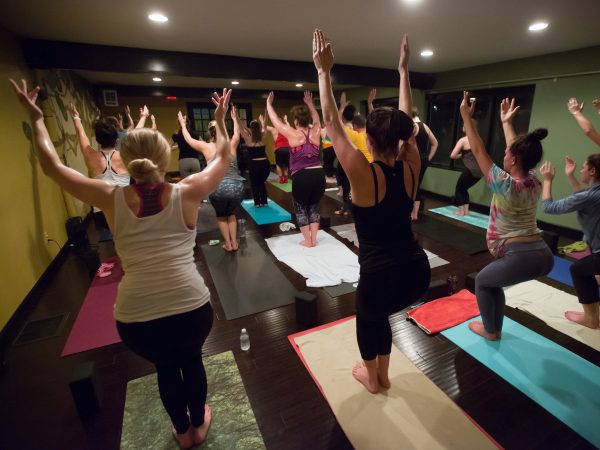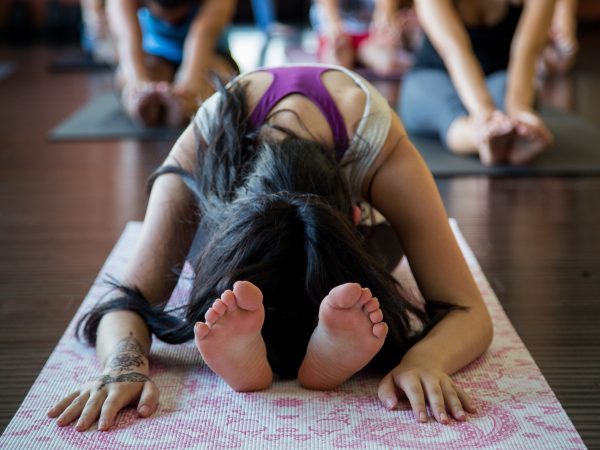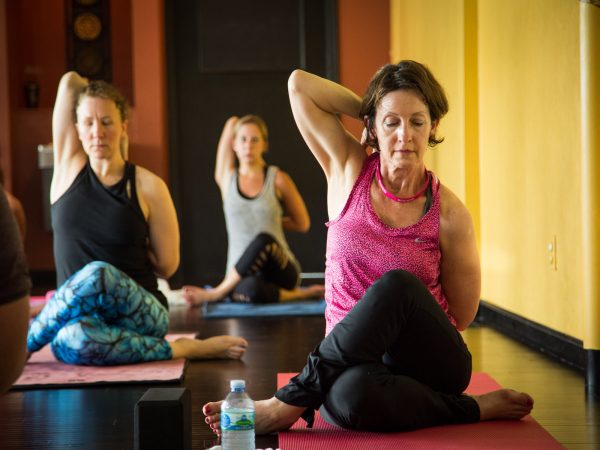To be touched or not touched. That is the question.
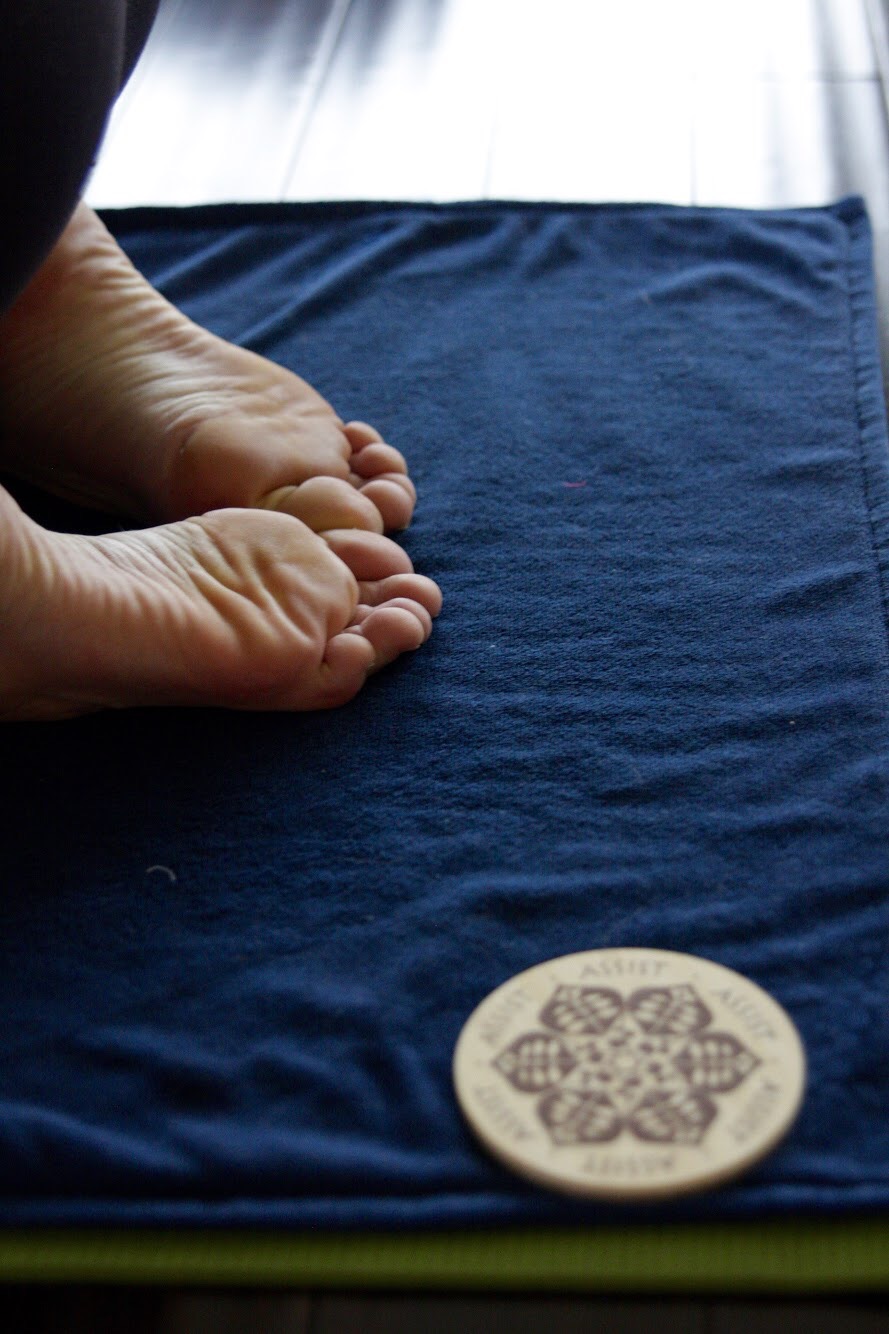
“What’s with the new “coasters” “ a student asks as they hold up the Flip Chip. If you haven’t seen yet, there is a stack of coaster like chips at the front desk now when you sign in. These are not coasters and are rather like a permission slip for the teacher. On one side it says “assist” on the other it says “do not assist.” Indicating if the student would like to be touched, or not. 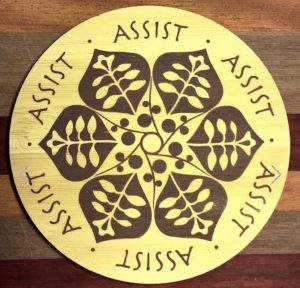
Five years ago, Dana told me about these cool things that help us know if people would rather NOT be touched, referencing the chips. My personal reaction was “No thanks. I don’t want people turning down what they might actually like.”
Fast forward five years later and now I’m asking myself, “who the hell am I to push my desires on someone whether they like it or not?”
We were on the cusp of completing our fourth teacher training and fresh batch of new faces were about to hit the floor as “teacher”. Part of training is learning how to ‘assist’ the student in the pose. We have lots of tricks up our sleeve that encompass the idea of “assisting you” and one of those is using our hands to help your body learn.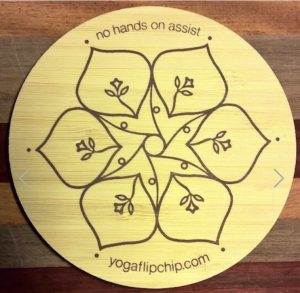
If you imagine yourself as a child while learning to throw a ball, hit a golf ball, swing a bat, write your name, etc. at some point I would bet the person imparting knowledge wrapped their hands and arms around you and showed you exactly how to do the movement with their own body. There’s science behind the theory and a social norm of this is how it is done.
These new graduates are encouraged to put their hands on people and try out all their new skills. And all of a sudden the fear of “What if they don’t want me to touch them sets in.” Every single training. Every single time that is a conversation we have.
As a director of the training it is nearly impossible for us to convince these people that our students WANT to be touched. Again fueling my personal belief I stated above. These assists feel GREAT. This might be the only time you as the student are touched all week and we are blessed to be able to give that gift… blah blah blah I could go on and on about all the reasons why we should.
These graduates year after year were expressing the same concern. “I know I like to be assisted as a student, but how do I know that someone else wants to be touched.” Not knowing is scary. The fear became so monumental it inspired some of them NOT to touch. Not to assist. In fear they might touch the wrong person.
More conversations, more personal satire, more asking around and ok we’re good to go now. I thought I had everyone smoothed out and hyped about assisting again, then, this article came out by Richard Gartner “Yoga Teachers Should Stop Assualting Students” and shit hit the fan, again.
Except this time my entire belief system was rocked.
I read the poem a few months ago by Charlie Chaplin on Self-Love and he referenced the definition of respect as “…I understood how much it can offend somebody if I try to force my desires on this person, even though I knew the time was not right and the person was not ready for it, and even though this person was me…” This resonated with me on a deep level. Respect was one of those words I was having a hard time defining in my life and this one hit the nail on the head.
I realized I was disrespecting students without even knowing. Maybe not everyone, or even the majority, but the few out there… the ones who quite frankly just “don’t want to be touched.” I didn’t acknowledge the barrier–this personal preference that was being created for those trying to move into their yoga practice. If you don’t want to be touched, you might have a hard time going to a yoga class, or if you do go– you are living in fear that someone might touch you.
The title alone of that article ‘Yoga Teachers Should Stop Assaulting Students” I scoffed at the line at first. And then put myself into the space on the days when I personally “have NOT wanted to be touched.” By friends, family, a massage therapist… no one. Those days when my skin crawls for whatever reason and I prefer the personal space…. Even if those moments are few and far between they still exist in each and every one of us.
I want the student who has those feelings more often to feel as accepted, comfortable, and supported as those who enjoy touch. Your yoga teacher should be the person who imparts comfort and security. We at Yoga Innovations want that for everyone who walks in our door from the moment they enter until they leave.
We believe the Flip Chips will give those who need space– exactly what they need. We also believe a room full of signs on the floor that say Do Touch me, will be acknowledged by our teachers too. We do want to make that extra connection. More so, we want to do it in a way that will be invited. Thankfully, now everyone feels reassured that our personal preferences– right down to the moment– are considered.
Reasons why you might choose to use the Do Not Assist Side
- I just don’t like being touched.
- Health wise not 100%, might be fighting off the onset of something or getting over something.
- Working with an injury
- Paying special attention to — and assisting would be a distraction. This might come up in a specific pose or even at the end during final relaxation.
- Newer to the practice and aren’t quite sure what ‘assisting” is going to be like.
It has been a few weeks now that these chips have been in play at YI and the response is really great. And yes, some students are selecting the Do Not Assist side.
I was humbled. Yet again, and not for the last time I’m sure… of how my own reality, my own perceptions and preferences were shaping how I was forcing others to experience things.
Just because I believe I make the BEST BANANA BREAD (This might actually be true…) doesn’t mean the person who is deathly allergic to bananas should eat it. No matter how good it is. Which boils down to: if you are the person who is deathly allergic to bananas– it is your job to make sure you don’t eat it.
Somewhere along the line the distinction was made, and ownership of this preference was engrained.
Compared to the person who just doesn’t like bananas. Even if I make the very best banana bread, if you don’t like bananas, it doesn’t matter how great it is, you still won’t like the bread.
Somewhere along the line the distinction was made, and ownership of this preference was engrained.
A fine line exists between the two. Will something physically happen if you eat the banana or do you simply not enjoy it?
If something physical is the effect– know that. Work towards acceptance (maybe zucchini bread?). If it is mental, it’s a different set of questions.
Similar to those last few breaths in your most uncomfortable yoga pose. You have two choices.
You can decide to hate bananas and NEVER consume, smell or even be around them… or begin to work towards the idea. Starting with looking at a banana, maybe smelling it from a distance.
That pesky yoga pose brings about the same process.
You can stay– and breathe just onnnnne more round before re-evaluating… or you can leave.
Sometimes, getting the hell out of there is the absolutely the right answer. Sometimes…. it isn’t. Sometimes we run away. We make a decision driven by fear instead of peace. We don’t use our wisdom, we don’t use reflection, and instead we make a snap choice like jumping away from a spider that drops down from the ceiling unexpected in front of us.
Life is not about living as if you’re swatting at the dropping spiders.
Our yoga practice enhances our skill to align and realign our focus. This internal focus begins to shine a light on our own personal preference. Through this constant reassessment, we begin to live our moments with a hint of joy. If we realize that breath by breath we have the freedom and the power to make a shift to suit us better– then we better damn well use it.
These Flip Chips take our internal awareness one step further by asking out loud what our preference is and give the freedom to change our mind at any moment. We fine tune our personal preferences by making small choices. Maybe today the question is about if you would like to be touched or not or what you should do with the pose you are in, and maybe tomorrow it’s about what you do off your mat.


